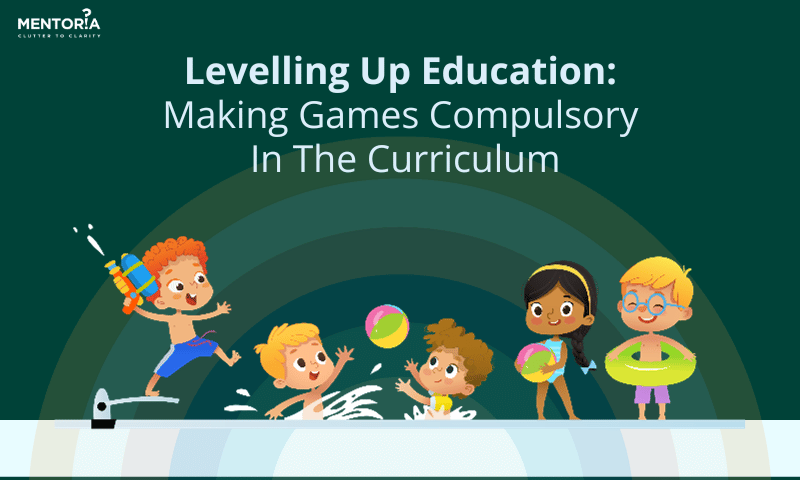Levelling Up Education: Making Games Compulsory In The Curriculum

Jump to Section
In a world increasingly dominated by technology and digital experiences, it’s time to rethink education. Traditional methods of teaching can sometimes struggle to engage students fully. But what if we could transform the learning experience into something that students actually looked forward to? That’s where the idea of making games compulsory in the curriculum comes into play.
Picture this: A classroom filled with eager students, each with a tablet or laptop in hand, ready to embark on a quest to solve complex problems, explore historical eras, or even learn a new language – all through the power of gaming. This is the future of education, and it’s closer than you might think.
The integration of video games into the curriculum isn’t just a fanciful notion; it’s a movement gaining momentum worldwide. Games, long considered a form of entertainment, are increasingly recognized as powerful tools for learning. From improving problem-solving skills to boosting creativity, the benefits of educational games are undeniable. In this blog, we’ll explore why making games compulsory in the curriculum is a game-changer for education.
Indian Schools Development Of games In The Curriculum
In the modern Indian education landscape, integrating games into the curriculum is gaining recognition as an effective pedagogical approach. Educational institutions are progressively acknowledging the importance of gamification to enhance the learning experience and foster holistic development. Here’s an overview of what Indian schools and institutes are doing with games in the curriculum:
Digital Learning Platforms:
Many schools have adopted digital learning platforms that incorporate interactive educational games. These platforms provide a gamified environment where students can learn and revise various subjects in an engaging manner.
Educational Apps and Software:
Schools are utilising educational apps and software that offer interactive games aligned with the curriculum. These games are designed to reinforce concepts, improve problem-solving skills, and make learning enjoyable.
Virtual Labs and Simulations:
Institutes are integrating virtual labs and simulations that simulate real-world scenarios in fields like science, mathematics, and geography. Students can experiment and learn through these interactive experiences.
Coding and Robotics:
Coding and robotics have become an integral part of the curriculum in many schools. Coding games and robotics kits are used to teach programming concepts, logic, and problem-solving skills, preparing students for the digital age.
Outdoor Learning Games:
Several schools are promoting outdoor learning activities and games that emphasise teamwork, physical fitness, and environmental awareness. These games encourage experiential learning and a deeper understanding of nature.
Incorporating Gamified Assessments:
Some schools are using gamified assessments, quizzes, and competitions to evaluate students’ understanding of subjects. This approach not only gauges their knowledge but also motivates healthy competition and active participation.
Life Skills through Games:
Schools are using games to impart life skills such as time management, decision-making, critical thinking, and financial literacy. These games create a safe space for students to practise and enhance essential life skills.
Innovative Teaching Techniques:
Teachers are embracing innovative teaching methods by gamifying their lessons. They integrate games, quizzes, and interactive challenges to make the learning process more engaging and effective.
Gamified Learning: A Transformative Experience
Gamified learning immerses students in a world of interactive challenges and quests, turning education into an engaging adventure. Complex subjects like mathematics and science become exciting when students conquer virtual kingdoms or conduct virtual experiments. Research unequivocally supports gamification’s ability to increase engagement and enhance knowledge retention. It also fosters a sense of accomplishment, as students are rewarded for overcoming educational hurdles, boosting their confidence and motivation.
Bridging The Generation Gap
Today’s students are digital natives, growing up in a world dominated by technology and gaming. Integrating games into the curriculum creates a common ground between students and educators. It’s an opportunity for teachers to connect with students on their terms, using a medium they understand and enjoy. This connection fosters a positive learning environment where students are more eager to participate, collaborate, and take ownership of their learning journey.
Fostering Critical Thinking And Problem-Solving
Games are intricate problem-solving ecosystems. Whether deciphering puzzles, strategizing in real-time, or making decisions with consequences, games demand critical thinking and analytical skills. These cognitive abilities are transferable to real-world scenarios, helping students tackle complex challenges in their academic and personal lives. By incorporating such games into the curriculum, we empower students to think critically, evaluate options, and apply their knowledge to real-life situations.
Learning Beyond Borders
Educational games have the remarkable ability to transport students beyond the confines of a classroom. They can explore ancient civilizations, witness historical events, and even journey through outer space—all from the comfort of their desks. This immersive experience opens windows to diverse cultures, historical periods, and scientific phenomena. It encourages students to develop a global perspective, fostering empathy, understanding, and a genuine appreciation for the rich tapestry of our world.
Tailoring Education To Individual Needs
Every student is unique, with varying learning paces and preferences. Educational games are adaptable, allowing them to be personalised to suit each student’s needs. Through intelligent algorithms, games can adjust difficulty levels based on individual progress, ensuring that students receive a customised educational experience. This approach not only helps struggling students catch up but also enables advanced learners to be appropriately challenged, maximising their potential.
Nurturing Creativity And Collaboration
Many educational games encourage creativity and collaboration. Whether it involves building virtual worlds, creating digital art, or working together in multiplayer settings, games stimulate students’ imagination and promote teamwork. They provide a platform where students can express themselves freely, brainstorm ideas, and execute projects collaboratively. These skills, honed in the gaming environment, are highly transferable to the modern workplace, where creativity and effective teamwork are in high demand.
Real-World Application
The skills acquired through gaming extend far beyond the confines of virtual worlds. Problem-solving, critical thinking, adaptability, and teamwork—all cultivated through gaming—are qualities that employers highly value. These skills equip students for success in a rapidly changing job market. Educational games provide a bridge between academic knowledge and real-world application, ensuring that students not only excel in their studies but are also prepared for the challenges and opportunities that await them in their future careers.
Measuring Progress And Performance
Incorporating games into the curriculum brings an invaluable tool for assessing student progress and performance. Game-based learning platforms often provide detailed analytics, tracking students’ interactions, achievements, and areas where they may be struggling. Educators can leverage this data to gain deeper insights into individual and class-wide strengths and weaknesses. This data-driven approach allows for targeted interventions, enabling teachers to provide additional support where needed and challenge advanced students appropriately. It also enhances transparency in the learning process, as students can see their own progress and understand how to improve.
Preparing For The Future Of Work
The future workplace is rapidly evolving, with a growing emphasis on digital literacy, problem-solving, creativity, and adaptability. Educational games align with the skills demanded in these emerging job markets. By introducing gaming into the curriculum, schools prepare students for the dynamic work environments they will encounter. These games provide a safe space to practise skills that are integral to success in the Fourth Industrial Revolution, such as coding, data analysis, and digital communication. By equipping students with these skills early on, educational institutions ensure they are well-positioned to thrive in a future where adaptability and tech-savviness are key.
Learn With Mentoria!
The integration of games into the curriculum isn’t about replacing traditional teaching methods; it’s about enhancing them. It’s about recognizing that education should be engaging, enjoyable, and relevant to the world our students will inherit.
Making games compulsory in the curriculum isn’t a far-fetched idea; it’s a response to the changing landscape of education and the demands of a digital age. It’s about equipping students with the skills they need to thrive in a world where adaptability, creativity, and problem-solving are key.
We’re here to provide you with all the help! Kick-start your journey with Mentoria and discover the right fit for you. Feel free to call us to speak to our career mentors and choose the right guidance plan that suits your needs.
Mentoria’s career guidance programme enables you to choose your perfect fit from 3 streams, 850+ courses, and 12,000+ careers, and discover what will bring out the best in you.









